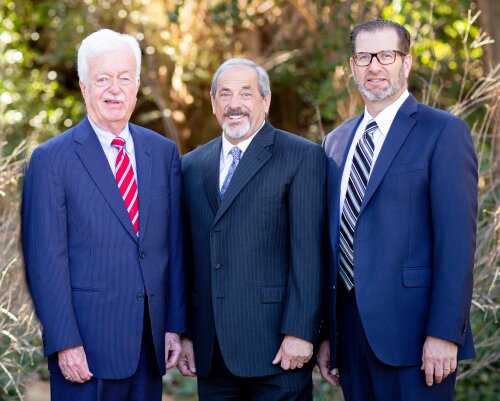Best Collaborative Law Lawyers in Redlands
Share your needs with us, get contacted by law firms.
Free. Takes 2 min.
Free Guide to Hiring a Family Lawyer
List of the best lawyers in Redlands, United States
About Collaborative Law in Redlands, United States
Collaborative Law is an alternative dispute resolution method that allows parties to resolve legal issues outside of traditional courtroom litigation. In Redlands, United States, Collaborative Law is most commonly used in family law matters, including divorce, child custody, and property division. This process involves each party hiring a specially trained collaborative attorney. All participants, including the attorneys, work together in a series of meetings to reach a mutually satisfactory agreement. The process is confidential, non-adversarial, and focused on open communication and fairness.
Why You May Need a Lawyer
You may require a lawyer skilled in Collaborative Law in several situations. Common examples include:
- Divorce or separation, where both parties seek an amicable resolution without going to court
- Disagreements regarding child custody or visitation arrangements
- Division of property, debts, and other assets
- Establishing or modifying spousal or child support
- Pre-marital or post-marital agreements
- Family business succession planning
A collaborative lawyer helps guide negotiations, ensures your legal rights are protected, and facilitates effective communication. Even though the process is less adversarial, it is important to have experienced legal representation to navigate complex discussions and legal documentation.
Local Laws Overview
Redlands, located in San Bernardino County, California, follows the state’s Collaborative Law statutes and guidelines. California has adopted provisions that support and regulate Collaborative Law procedures. Key points to understand include:
- Both parties must voluntarily agree to the Collaborative Law process and sign a participation agreement
- Collaborative Law attorneys cannot represent their clients in court litigation if the collaborative process fails
- All discussions during collaborative meetings are confidential and cannot be used as evidence in subsequent court proceedings
- Other professionals, such as child specialists, financial advisors, or mental health professionals, may participate to provide neutral advice and help resolve issues
- The process is designed to minimize conflict and prioritize the interests of all family members, especially children
Understanding these laws helps participants set expectations and ensures the collaborative process is conducted fairly and within legal guidelines.
Frequently Asked Questions
What is Collaborative Law?
Collaborative Law is a legal process where parties resolve disputes through open negotiation, with the help of their lawyers, instead of going to court.
How is Collaborative Law different from mediation?
While both aim to resolve disputes outside of court, Collaborative Law involves each party having their own attorney, and additional neutral professionals can participate. Mediation usually involves a single neutral mediator without legal advocacy for individual parties.
Do I have to go to court if I choose Collaborative Law?
No, the goal is to resolve issues without court involvement. If an agreement is reached, only the final documents are submitted to the court for approval.
What happens if we cannot reach an agreement?
If no agreement is reached, both collaborative attorneys must withdraw from the case, and new legal counsel must be retained to pursue traditional court litigation.
Is the Collaborative Law process confidential?
Yes, discussions, documents, and negotiations in the collaborative process are confidential and cannot be disclosed in court.
Are agreements reached in Collaborative Law legally binding?
Yes, once signed by both parties and approved by a court, these agreements are legally binding. Your attorney will ensure all legal requirements are met.
How long does the Collaborative Law process take?
The time frame varies depending on the complexity of the issues and the parties' willingness to cooperate. However, it usually takes less time than a traditional court case.
Who pays for the professionals involved in the Collaborative Law process?
Typically, each party pays their own attorney. Costs for shared professionals, such as financial advisers or child specialists, are usually divided between the parties.
Can Collaborative Law be used for matters other than divorce?
Yes, it can be used for prenuptial agreements, postnuptial agreements, custody and parenting plans, and other family or civil disputes.
How do I find a Collaborative Law attorney in Redlands?
You can find experienced Collaborative Law attorneys through local bar associations, lawyer referral services, or organizations that focus on alternative dispute resolution.
Additional Resources
Several resources and organizations can provide additional information or assistance regarding Collaborative Law in Redlands:
- San Bernardino County Bar Association - Provides lawyer referral and information services
- Collaborative Practice California - Statewide organization supporting Collaborative Law professionals
- California Courts - Family Law Self-Help services and information centers
- City of Redlands Legal Services - Offers local guidance on legal matters
- Local Family Law Facilitator’s Office - Offers limited assistance to self-represented parties
You can contact these organizations directly for referrals, more information about the process, or support services.
Next Steps
If you believe that Collaborative Law might be the right approach for your legal situation in Redlands, consider taking the following steps:
- Reach out to local Collaborative Law attorneys for an initial consultation
- Prepare a list of your concerns, goals, and questions to discuss with your attorney
- Communicate with the other party about the possibility of resolving your dispute collaboratively
- Request information about costs, expected timelines, and required documents
- Contact local resources or organizations for additional information or referrals if needed
Collaborative Law offers a respectful way to resolve legal disputes while prioritizing open communication and minimizing conflict. Having knowledgeable legal counsel can ensure your interests are protected throughout the process.
Lawzana helps you find the best lawyers and law firms in Redlands through a curated and pre-screened list of qualified legal professionals. Our platform offers rankings and detailed profiles of attorneys and law firms, allowing you to compare based on practice areas, including Collaborative Law, experience, and client feedback.
Each profile includes a description of the firm's areas of practice, client reviews, team members and partners, year of establishment, spoken languages, office locations, contact information, social media presence, and any published articles or resources. Most firms on our platform speak English and are experienced in both local and international legal matters.
Get a quote from top-rated law firms in Redlands, United States — quickly, securely, and without unnecessary hassle.
Disclaimer:
The information provided on this page is for general informational purposes only and does not constitute legal advice. While we strive to ensure the accuracy and relevance of the content, legal information may change over time, and interpretations of the law can vary. You should always consult with a qualified legal professional for advice specific to your situation.
We disclaim all liability for actions taken or not taken based on the content of this page. If you believe any information is incorrect or outdated, please contact us, and we will review and update it where appropriate.









